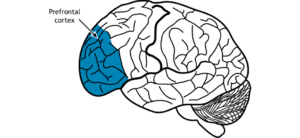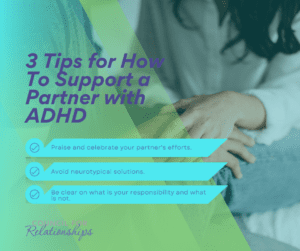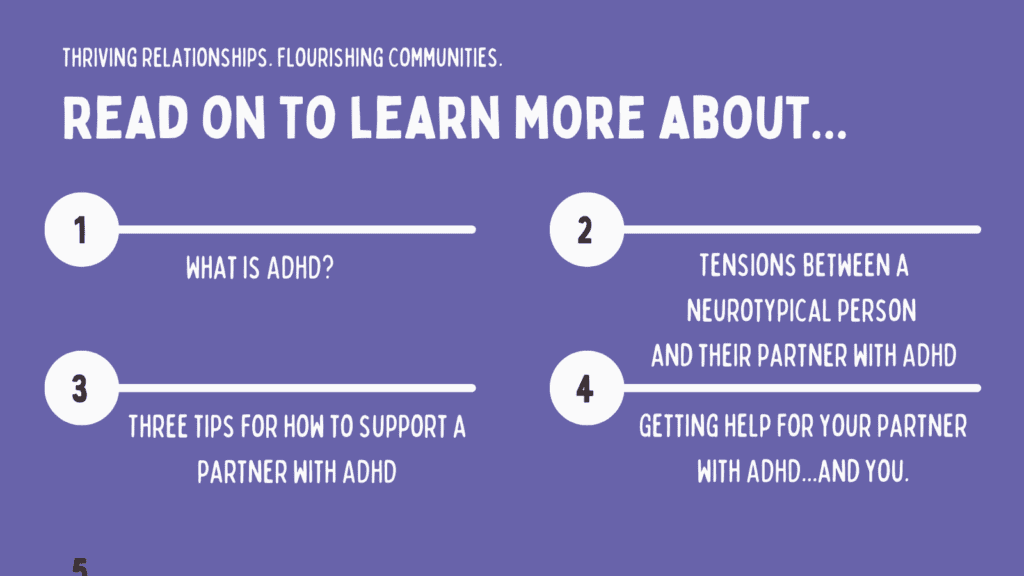How To Support a Partner with ADHD: 3 Tips
Does your partner have ADHD, and you are at a loss for how to support them best? Perhaps your relationship is suffering because, well, it can be frustrating when you can not be there for your loved one. Read on to learn the ADHD basics, tips for supporting a partner with ADHD, and where you can find outside help if needed.
Tips for Supporting a Partner with ADHD
In every partnership, some differences must be navigated – and this is especially true in partnerships between neurotypical people and neurodiverse people with ADHD.
Our brains work in distinct and different ways. Those differences can lead to conflict or offer an opportunity for deeper understanding, intimacy, and communication between you and your partner.
So, what makes an ADHD brain different from a neurotypical brain?

Diagram of human brain courtesy of Michigan State University.
What is ADHD?
For those who have ADHD, the frontal lobe of the brain is smaller and less developed. That is the part of the brain where our prefrontal cortex exists. The prefrontal cortex is responsible for executive functioning, judgment, and self-regulation. Neurologically, ADHD is a lack of inhibition (or brakes) in the prefrontal cortex, which can manifest as struggles to focus and pay attention.
There is also less dopamine present in the brains of those with ADHD than there is in a neurotypical brain. That lack of dopamine is one of the reasons that it can be challenging for those with ADHD to do small, mundane tasks. In other words, the reward does not feel worth the effort.
Lastly, a part of the brain called the Default Mode Network (DMN) is more continuously activated in those with ADHD, making it difficult to focus on one thing at a time.
Tensions between a neurotypical person and their partner with ADHD
These neurological differences can lead to some common points of tension in partnerships.
Often, the neurotypical partner can over-function or take on a lot of tasks, leading to resentment and frustration or a sense of being managed by the partner with ADHD. Neurotypical partners also may not understand that their partner’s brain is structured and wired differently and may interpret their partner’s struggles to follow through or complete tasks as a lack of care.
These differences in how our brains function can create distance and disconnection in our partnerships. But they do not have to!
 Three tips for how to support a partner with ADHD
Three tips for how to support a partner with ADHD
If you are a neurotypical person partnered with a person with ADHD, here are a few strategies that could help you move toward connection and understanding in your partnership:
Tip #1: Praise and celebrate your partner’s efforts.
When you praise your partner, it gives their brain the extra hit of dopamine that a neurotypical person would get simply from accomplishing a task. In this way, praising your partner for even small or ordinary tasks acts as a strong motivator.
Praise is also an antidote to criticism and shame, both common experiences for people with ADHD. Because our awareness of ADHD is relatively recent, many of today’s adults who have ADHD likely grew up in families and environments that did not understand ADHD and may have shamed or punished their symptoms. It is common for children with ADHD to receive significantly higher amounts of negative feedback than a neurotypical child. Consequently, many adults with ADHD can feel triggered by comments that appear to be critical.
Celebrating your partner’s success and efforts, big and small, is a way to motivate them, tackle the tasks you need to tackle as partners and be a voice offering support rather than shame or criticism.
Tip #2: Avoid neurotypical solutions.
What works for your brain may not work for your partner’s brain.
In moments of stress, we usually turn to solutions that have worked for us in the past. For instance, maybe setting an alarm 15 minutes before you need to do something helps you remember to complete a task.
That likely would not work as well for your partner with ADHD due to how their short-term memory operates. Putting a sticky note on the door or by their keys might work better for them so that they see it right when they need to do the task.
Ask your partner what works for their brain and get creative together in finding solutions that work for both of you.
Tip #3: Be clear on what is your responsibility and what is not.
A common dynamic is for the neurotypical partner to take on tasks that their partner with ADHD finds challenging. This is known as “over-functioning.”
While over-functioning can alleviate stress in the short term, it tends to create resentment and frustration for everyone in the long term. Communicate clearly and often about how you are divvying up tangible and emotional responsibilities and what it means to manage them satisfactorily.
For example, Instead of “Clean the kitchen,” it is more helpful to say, “Cleaning the kitchen means loading and starting the dishwasher, putting leftovers away, and wiping the counters.”
Something like the Fair Play book and card deck might be beneficial here. It offers a framework for how to assign tasks equitably, set minimum standards of care for those tasks, and check in regularly to ensure greater clarity and less resentment.
Getting help for your partner with ADHD…and you.
Sometimes, outside support from a therapist can help you and your partner best navigate your differences in ways that promote connection and mutual respect.
Contact me or another therapist at Council for Relationships if you want support using your differences to grow and find greater intimacy with your partner.
About the Author
Amy Leonard, LMSW, is a Pennsylvania Staff Therapist at the Council for Relationships. If you have questions about her tips for supporting your partner with ADHD or Amy’s availability to see new clients, go here.
See our Therapist & Psychiatrist Directory to find a different CFR therapist or psychiatrist near you.
More from CFR
Disenfranchised Grief: How the Passing of My Cat Made Me a Better Therapist
Taylor Swift Songs about Mental Health: Fearless (Taylor’s Version)


